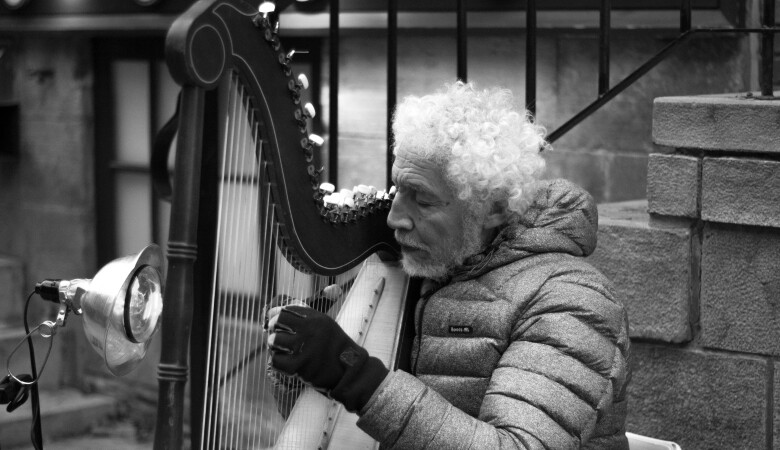Counting the Cost of Following Christ (Matthew Sermon 26 of 151)
July 07, 2002 | Andy Davis
Matthew 8:18-22
Abiding in Christ, Persecution, Boldness & Courage, Temptation
We're looking this morning in Matthew 8:18-22 at the cost of following our Lord Jesus Christ. In 1803 representatives of the United States of America met with Napoleon Bonaparte and bought a chunk of land from him- the Louisiana Purchase- 828,000 square miles for $27 million, which is less than a signing bonus of some NBA athletes these days. It worked out to just less than three cents an acre, an incredible bargain when you stop and think about it. Included in the Louisiana Purchase are the states of Louisiana, Missouri, Arkansas, Iowa, North and South Dakota, Nebraska, and Oklahoma as well as parts of Kansas, Colorado, Wyoming, Montana, and Minnesota. At the time that the purchase was made, the $27 million represented a huge chunk of the Federal Reserve, but it was deemed worth it.
Cheap Grace
The costs of following Christ Jesus is also deemed worthy as it offers us every spiritual blessing in the heavenly realms, for he offers us full pardon of all of our sins, past, present, and future through His blood. He offers us fellowship with believers, from all ages into all eternity, he offers us His own righteousness to cover us on judgment day, He offers us eternal life. Does he ask nothing of us? No, he does not ask nothing of us. For just as He offers everything to us, he also asks everything from us. I think we're losing sight of that, more and more as we go on in American Evangelicalism. We've slipped into something called “cheap grace”. Think about what Jesus said when he talked about the pearl merchant who looks everywhere for excellent pearls, and when he finds one of great value, he understands the value of that pearl so much so that he goes and sells everything that he has, so that he can buy that pearl. Or think about the man in Palestine, who finds a treasure of great value hidden in the field, and then in his joy, not grudgingly but in his joy, he sells all of his possessions, that he might buy that field.
I think we've lost the fact that in both of those stories, there's a selling first before there's an obtaining. Am I thinking that we can buy salvation? No, it's far too expensive. Only the blood of Jesus Christ could purchase our freedom from the wrath of God. Yet there was a cost to following Jesus, and it is not “cheap grace”. Dietrich Bonhoeffer spoke of “cheap grace”. Dietrich Bonhoeffer was a brother in Christ who lived in Nazi Germany during World War II and wrote a book translated into the words the cost of discipleship. He wrote about this phenomenon called “cheap grace.” He said, “Cheap grace is the deadly enemy of our church.” We are fighting today, for costly grace.
“Cheap grace” is the preaching of forgiveness without requiring repentance, baptism without church discipline, communion without confession. “Cheap grace” is grace without discipleship, it is grace without the cross-grace, without Jesus Christ living and incarnate; costly grace is the treasure hidden in the field for which the man will gladly go and sell all that he has. It is the pearl of great price to buy for which the merchant will sell all his goods. It is the kingly rule of Christ for whose sake a man will pluck out the eye which causes him to stumble. It is the call of Jesus Christ at which the disciple leaves his nets and follows Christ. Such grace is costly said Bonhoeffer because it calls us to follow, and it is grace because it calls us to follow Jesus Christ. It is costly because it costs a man his life, and it is grace because it gives a man the only true life there is. It is costly because it condemns sin, and it is grace because it justifies the sinner. Above all, it is costly because it cost God the life of his son. You were bought at a price, the Scripture says.
Dietrich Bonhoeffer speaking on “cheap grace” versus “costly grace” said that this grace is not cheap because God did not reckon his son too dear a price to pay for our life but rather gave him up for us all. Bonhoeffer was here in America in the summer of 1939 at seminary with American friends. He saw that war was imminent. His friends begged him to stay in the States and to continue work here, but he said no, that there would be war. Looking ahead, he said that his country will need to be rebuilt. He assumed that Germany would lose the war, and he said "I cannot be with them in the rebuilding and the reconstruction of the church in Germany and not suffer through the war with them. I must go back.” Soon after he returned home, World War II began. Dietrich Bonhoeffer was martyred in May of 1945. It's one of the last acts of Adolf Hitler before Hitler took his own life. Bonhoeffer knew that when Jesus Christ bids us to follow, he bids us come and die, to be willing to lay down one’s life. That is true; it is to that kind of costly following of Christ that today's Scripture calls us.
We need this message. Don't we? Today's American gospel has very little concentration on the preaching of the law, or the wrath of God. Christ proposed is proposed as someone who will make your life better — a life enhancer — it goes better with Christ, you know, that kind of thing. The key verse for this way of looking at Christianity is to hear, “As I have come that they may have life and have it abundantly” and take this abundant life saying and run it through the mill of our carnal imaginations and think “What kind of abundant life did Jesus come to give? Well, it's a life of material possessions, a life of freedom from inner turmoil and external troubles. It’s a life in which there are resources to solve all your problems. You'll have friends, you'll have popularity, you'll have all kinds of good things coming. If you'll only follow Christ, conviction of sin is minimal. Constant assurance of salvation is given.” I think now more than ever, we need to hear again the words of the text that we're looking at today. "Foxes have holes, birds of the air have nests, but the son of man has no place to lay his head.” More than ever we need to count the cost of following Christ.
Seeker Sensitivity
This passage I believe banishes “cheap grace”, and delves into true motivations for following Christ. There's a movement today called Seeker sensitivity that’s a part of the overall church growth movement. It's good for us to look at this passage and try to understand seeker sensitivity according to Jesus. How would Jesus be sensitive to seekers? What would he do with somebody coming to him who's interested in following him? The modern church growth movement, espouses a view called Seeker Sensitivity. They want you to be sensitive to seekers. Modern church growth is constantly looking at ways to enlarge one’s church by studying the science of what makes a church grow, specifically numerically. With this kind of approach to church growth it is difficult to discern the difference between a church and a crowd. You appeal to un-regenerate sensibilities. In this approach the physical arrangement of the church is paramount. You need a new church building with state of the art physical arrangements since physical comfort is the constant goal. Pleasure, earthly pleasure, the organizing theme, there's going to be visual pleasure with that attractive sanctuary. The more striking the better, there's going to be auditory pleasure, music that attracts and appeals to the ear. There is nothing wrong with that, but it is wrong when this is the focus. The seeker sensitive values relational pleasure— there's going to be friendly, happy people welcoming you in and ushering you to your place, no problems inside here, no difficulties only pleasure. There's going to be heart pleasure; messages that are relevant and that minister to your heart, you walk away feeling good every time. That's the approach, that's the formula for church growth — be sensitive to seekers.
First of all, let us ask what is a seeker? It's somebody who shows interest in spiritual things, right? Somebody who might come to Christ and say, "I'll follow you wherever you go.” Somebody interested in spiritual things. That's a seeker, but the Scripture testifies that no one naturally seeks God. Think again what it says in Romans Chapter 3:10-12, “As it is written, There is no one righteous. No, not one. There is no one who understands…” Listen to the next part, “No one Who seeks God.” No one naturally seeks God, the Bible says, “All have turned away.” So if someone is genuinely seeking Christ, guess what? According to John 6:44, it is the Father who is drawing them. “No one can come to me,” said Jesus, “unless the Father who sent me draws him and I will raise him up at the last day.” So a true seeker is somebody that the Father is drawing into full commitment to Christ, right? Somebody who is interested in following Christ, the way He really desires to be followed. That's what seeker is. What does it mean to be sensitive to the seeker? With the church growth approach, seeker sensitivity, says we must filter out anything that would cause them to turn away from Christ. You see what I'm saying? We're going to filter out any difficulties, we're going to filter out anything offensive or troubling, especially filter out any mention of sin or conviction or wrath or judgment or hell. These things are not popular and so we're going to filter them out. We'll get to them by and by since we are after all an evangelical church, we'll get to them by and by, but at the first blush we're not going to talk much about them, we want the seeker to be comfortable; we want them to come... “I want to meet them where they're at,” is the expression. We're also going to filter out any offensive aspects of the gospel message, the cross, the blood, the thorns, the stripes of Christ and also the narrow gates and the commitment that it's takes to be to follow Jesus Christ. Those ideas are for the advanced seekers, you see.
Is this Jesus' approach to a seeker? Not at all. What is seeker sensitivity according to Christ? Jesus was constantly going for the heart. What is going on in there? He understands the genuine needs of each person. Think about a parallel account of the rich young ruler. There's a seeker who comes and says, "Lord what good thing must I do to get eternal life?” Jesus, after some discussion, says, “One thing you lack, sell all your possessions and give to the poor, and you will have treasure in heaven and then come follow me.” I can see at this moment, a church growth consultant coming alongside Jesus as the rich young ruler walks away because he had many possessions, and saying, “Jesus, you've got a great message and people are really warming to it, you're doing well. But that was a mistake right there. What happened there was a mistake. Here's a guy who's rich first of all. He's young, he's got years ahead of him. He's a ruler in a position of authority, and you turn him away. Now, We like what you're doing. But I might try a different approach.” Jesus' brothers tried to do the same in John chapter 7, where they're giving Jesus PR advice. “No one seeking to be a religious leader behaves the way you do.” Could it be that Jesus was not seeking to be what they wanted.
The Rich Young Ruler
Could it be that His ways are higher than our ways, and His thoughts higher than our thoughts, and could it be that the idolatrous rich, young ruler really did need to sell his possessions in order to follow Christ? We have in our text today two seekers coming to Jesus. How does he deal with them? What approach does he take? First, we have a teacher of the law. In verse 19, the teacher of the law comes to him and says, “Teacher I will follow you wherever you go.” What an opportunity... First of all, he is a teacher of the law which means he's used to a comfortable standard. He's at the higher echelon of Jewish society, well respected in Jewish culture. He's a scholar who is constantly studying the word of God. They, scribes, they were called would write copies of the Bible and make them available for synagogues. They didn't have printing presses so this man spends his full time copying scripture. He's called a teacher of the law, so he would also teach scripture. He was probably wealthy among the upper echelon of society.
In Matthew's Gospel we see that teachers of law were not usually friends of Jesus. This man was an anomaly. He was interested in Jesus. He actually is very interested in Christ. He's not opposed to Jesus as were most of the teachers of law who constantly challenged Christ. In Mark 14:1 it was the teachers of the law who met together plotting to kill Jesus. Jesus for his part in Matthew 23, gives them the seven woes. “Woe to you teachers of law and Pharisees, you hypocrites.” But this man is an exception. He comes up and gives Jesus in effect a blanket declaration of loyalty. “Teacher, I will follow you wherever you go.” He's in effect handing Jesus a blank check when he says, "I'll follow you wherever you go.” Jesus in verse 20 challenges him deeply. Jesus replied, "Foxes have holes. And birds of the air have nests, but the Son of Man has no place to lay his head.” Was Jesus driving the teacher of law away? Not at all. He was basically preparing him for the kind of earthly life a disciple of Jesus Christ could expect. It's not what you think He's saying to the teacher of the law. It's not a life of miracles, celebrations, power and ever-increasing glory until we take the throne in Jerusalem. It's not going to be like that. Physical earthly comfort is not in my future. And if you're going to follow me, it's probably not going to be in your future either. "Foxes have holes and birds of the air have nests, but the son of man has no place to lay his head.” Now think about that, Jesus had just gotten done with the Sermon on the Mount. Remember how he says in Matthew 6, that we're not to be anxious for anything. “Don't worry about what you'll wear, don't worry about what you'll eat and why? Because look at the birds of the air. They don't labor or spin or do any of those things. And you heavenly father provides them. You're worth much more than they are.” So don't worry about food, don't worry about clothes, don't worry about any of those things. And yet, just two chapters later, he's saying, "Oh by the way, the foxes and birds get it better than I do. Foxes and birds get it better than the Son of Man on Earth. Are you ready to follow me? Are you ready for that kind of life? It's challenging. Do you find it interesting that we get no response, here? We don't find out what happens with this man. Did he follow? Did he not? Wouldn't you love to know. But you know something, it's written in here not for him, is it? Who's it for? It's for us. What about you? "Foxes have holes, birds of the air have nests. I don't know where I'm going to sleep tonight. I don't know where I'm going to be.” Will you follow me anyway says Jesus.
Forsaking Family to Follow Jesus
Then the second seeker, another disciple, said to Him, "Lord first let me go and bury my father.” He's called the disciple; he's willing to follow Jesus. He's already following Jesus around, listening to his teachings. But he sticks in a word, and there's the problem. He said, “Lord first, first let me go and bury my father. “ That word “first”. Do you know what the problem is? It's got to do with his hierarchy of values. “My first, and most important value Jesus is not following you. My first, and most important value is I've got to go take care of my father.” What does he mean when he says "let me go and bury my father”? It doesn’t means that his father was on his death bed. It was a Jewish way of saying “I have responsibilities as a son.” We don't know but perhaps he was a first born, and he stood to inherit his father's possessions, but if he did not stick around and care for his father, he would forfeit and the next born son would get his inheritance. John MacArthur put it this way: since a man's inheritance was customarily lost or reduced if He did not fulfill his expected duties to the family, the phrase “I must bury my father” was frequently equivalent to... I want to wait until I get my money. After I get my inheritance, then I will follow you. It was open-ended. It could be years and years away before he finally followed Jesus. Jesus speaking about that hierarchy of priorities said, "Anyone who loves his father or mother more than Me is not worthy of Me.” Do you hear that, anyone who loves father or mother more than Me is not worthy of Me?
There's a hierarchy here, isn't there? According to Jesus there is no higher call than following Christ. There's no higher call than loving Jesus and serving Him with all your heart. Any other earthly commitment comes lower than that. In a parallel account in Luke, another disciple said, "I will follow you Lord, but first permit me to say good-bye to those at home." But Jesus said to him, "No one after putting his hand to the plow and looking back, is fit for the Kingdom of God." You can't look back, we're moving ahead, we're not going backward into inheritances and houses and lands and all of those things. It's interesting the second half of what He says, "Follow me and let the dead bury their own dead." What does that mean? “Let the dead bury their own.”.. How do dead people bury other dead people? I think it would be clear if we understood, let the spiritually dead bury the physically dead but you follow me. What does it mean- the spiritually dead? According to Ephesians Chapter 2, "Before we come to faith in Christ, we are every one of us dead in our transgressions and sins."
If you haven't come to Christ yet, you're dead in transgressions and sins. So Jesus says, "Leave that earthly way of thinking for people who don't know life yet. Leave it for those who are dead and you come follow me.” Now we know, doctrinally that no one is saved by following Jesus. You're not saved by your good works, you're not saved by any of those things. You're saved by faith alone, but by faith alone, appearances can be deceiving. You can have somebody that's going to say, "I'll follow you wherever you go. I'm willing to do anything." But it's Jesus, with the precision of a heart surgeon, that goes right to the heart of the matter and says, "What is really going on inside of you? Have you trusted me with all of your heart?” In John Chapter 2, John says of Jesus, "Many people saw the miraculous signs he was doing and believed in his name, but Jesus would not entrust Himself to them for he knew all men, he did not need anyone's testimony about what was in a man, for he himself knew what was in a man." In other words, people wanted to come entrust themselves to Jesus, but he would not entrust Himself to them because he saw what was going on in their hearts.
The Cost of Following Jesus
Simple faith is not so simple, the faith that saves is a faith that will follow even if Jesus has no place to lay his head that night. What we need instead is Christ's definition of an abundant life. What kind of life do you expect as a Christian? What do you think it's going to be like the rest of your years here on earth? What is your life in following Jesus going to be like? There's a common misconception that Jesus has come into our life as a life enhancer. I heard a tape recently talking about this, and there's an analogy concerning Christ as life enhancer. Suppose you're on an airplane and the stewardess comes and offers you a parachute saying, "I want you to put this parachute on. It's going to improve your flight. It's going to make every part of your flight more pleasurable and more enjoyable. Go ahead and put it on." This sounds good, I want my flight enhanced, so I will put this parachute on. You put the parachute on, but you know those seats are pretty small, and the enclosure just got a little tougher. You're now leaning forward, the parachute pushing you forward. It's an eight-hour flight and you're going to make it with a parachute on your back. Then they bring you the meal, and the tray is jammed into your chest, and you're having a hard time eating it anyway. Suddenly you notice that no one else has a parachute on. You're the only one. The other passengers are looking at you like, "What's that for?" "Well she told me my flight would be enhanced," and they start to titter and laugh and make jokes about you and criticize you. Or family members think you're insane and none of them have a parachute on either. Eventually, what are you going to do to that parachute? It's not really enhancing your fight very much, is it? You're gonna to get rid of it. Suppose instead a stewardess comes and says, "Here I have a parachute for you if you don't put it on, you're going to die because we have four engines on fire right now, and one of the wings is about to break off and within probably 10 minutes you're going to be hurdling through space. Put the parachute on if you want to live." Will you put that parachute on? Yes, now the discomfort of leaning forward in the seat is nothing to you, the in-flight meal doesn't look very appetizing. and you're only thinking about one thing and that is surviving what's about to come. I think if we preach the Gospel with the law, and you understand that Judgment Day is coming, and wrath is coming, and you have to give an account for every careless word you've spoken, and you cannot survive unless your righteousness surpasses that of the Pharisees and teachers of the law, that you will by no means enter heaven, and Jesus comes and says, "I will give you my righteousness, I will take all of your sins off of you. Follow me and I will lead you to Heaven. But along the way you're going to have trouble and difficulty and struggle and strife. But in the end, you will have full rewards by grace, and you will not die in the lake of fire, but you'll be with me forever.” Will you take that parachute off? Or will you put up with whatever comes your way? We need a new definition I think therefore, of abundant life. It is not Jesus as life enhancer.
What is abundant life according to Jesus? It's, “I don't have a place to stay tonight, but it doesn't matter because I'm going to be in the center of my Father's will. Everything I do, will be according to his way, and when I've finished, I will have brought him glory on Earth by finishing all the work he gave me to do, and there will be eternal fruit as a result.” I don't know where I'm going to stay tonight, but I know that I'm going to be in the center of my Father's will. "My food," said Jesus, "is to do the will of Him who sent me and finish my work." Knowing God is abundant life. “Now this is eternal life, that they may know you, the only true God and Jesus Christ whom ye have sent.” Now that is sweet, that is abundant, and in the middle of trials, just like Paul and Silas, you can be singing in prison praising him. Why? Because it's exactly what you knew was coming.
Application
What application can we take from this? We have to count the cost of following Jesus. First of all, praise Jesus that he was willing to leave his father's throne above, and come down and live that kind of life for you. Think about it, look at all He left behind: He left His father's throne above so free, so infinite His grace, emptied Himself of all that love, and bled for Adam's helpless race. That's what Jesus did, He was willing to leave the throne and say, "I've got no place to stay tonight, I'm going to be homeless, I'm going to walk through somebody's wheat field, I'm going to pluck heads of grain, roll them in my hand...
Secondly, evangelism. We need to be more honest folks. We need to tell people the truth right from the start. We need to tell them that Judgment Day is coming and Jesus offers them the only hope of salvation. What kind of life do you expect the rest of the way? Jesus is not a life enhancer; He's a Savior, and He came to give you eternal life.
We need to get up therefore every day as Christians, and count the cost. Can you say, "Am I willing to follow Jesus today? Suppose it leads me into discomfort, suppose it leads me into trouble. Will I follow him anyway? Am I willing to follow Him no matter what?" We need to understand luxury and necessity differently. Have you ever thought about Jesus's last will and testament? Who was on his will? "To my mother I bequeath... " What? Do you remember what he... What did he carry with him up the cross? No money. Everything was gone. He had his clothes. And what happened to them? Well, they got gambled away to fulfill a prophecy. He had nothing left. He had nothing earthly to give. What about Paul? Paul's inventory of what was truly necessary. 1 Timothy Chapter 6, he said, "If we have food and clothing, we'll be content with that."
Americans have expectations of earthly comfort, don't we? We have expectations that it must be comfortable, it must be pleasurable, it must be plenty, or else I will not follow Jesus. Our wealth is not evil, is it? Not at all. But there are certain ways that we are called to live. 1 Timothy 6, verse 17 and 18, "Command those who are rich in this present world not to be arrogant nor to put their hope in wealth which is so uncertain, but to put their hope in God who richly provides us with everything for our enjoyment. Command them to do good, to be rich in good deeds and be generous and willing to share." How then shall we live? The apostle Paul, who's learned the secret of being content in any and every situation, well fed or hungry, living in plenty or in want says, "I can do everything through Christ who gives me strength."
Jesus knew how to feast and he knew how to go through forty days in the desert with nothing to eat. He could do all those things through the will of His Heavenly Father. So what's a good diagnostic for your expectations? Have you complained at all this past week? I think complaints are a good indicator of expectations. You take faulty expectations and combine them with difficult circumstances, and out comes a complaint, right? Jesus worked on faulty expectations. "Foxes have holes, birds of the air have nests, the Son of Man has no place to lay his head. That night, they laid down on the ground and the guys who followed said, "Well, He told us this is what was going to happen."
If you expect kings' palaces and instead you lay on the ground that night, you're going to abandon the faith, walking away from Jesus. What kind of life do you expect? What's it going to be like from here on out for you? From the apostle Paul, “Five days, five times I received from the Jews the 40 lashes minus one, three times I was beaten with rods, once I was stoned, three times I was shipwrecked. I spent a night and a day in the open sea. I've been constantly on the move. I've been in danger from rivers, in danger from bandits, in danger from my own countrymen, in danger from Gentiles, in danger in the city, in danger in the country, in danger at sea, and in danger from false brothers. I have labored and have toiled and have often gone without sleep, I've known hunger and thirst, and I've often gone without food, I've been cold and naked.” Will you come anyway, if that's what I promise you? At the IMAX in Raleigh and saw the story of Shackleton who went down to Antarctic, and you know how he recruited people? The sign said, "Dangerous journey, small pay, extreme cold, healthy return unlikely." 5,000 people showed up to be with Shackleton. Jesus in effect does that, he says, "Will you follow if this is what it's going to be like?" I think you will, if you're one of His sheep, "My sheep hear my voice and they follow." I’ll follow him anywhere, I will go with him. Why? Because the Lord Jesus alone has the words of eternal life. I have no other way to survive Judgment Day and I will follow Him, I will follow Him to the end.
This is what Jesus said, "Follow me and I will make you fishers of men. Follow me and serve me. John 12:26, "Whoever serves Me must follow Me, and where I am My servant also will be, My father will honor the one who serves me. Follow me and be willing to suffer disgrace." Hebrews 13, "Jesus also suffered outside the city gate to make the people holy through His own blood. Let us then go to him outside the camp, bearing the disgrace he bore." That means if you follow Christ, people might not like you, people might reject you; follow him anyway. "Follow me," Jesus said, "and be willing to die." Jesus said, "If anyone would follow me he must deny himself, take up his cross and follow me. And follow me all the way to Heaven. I am the way, and the truth, and the life. No one comes to the Father except through me."
Many of you perhaps have heard sermon after sermon, perhaps you didn't understand what the Christian life was genuinely about. Jesus says if you've never trusted Him, you are dead in your transgressions and sins. "Follow me and let the dead bury their own dead." Jesus has life giving power. He can speak and Lazarus comes alive. Come to Christ today. What are you expecting when you follow Jesus? Will you follow him anywhere? Even if foxes have holes, and birds of the air have nests, but the Son of Man has no place to lay his head. Will you follow Jesus?






























